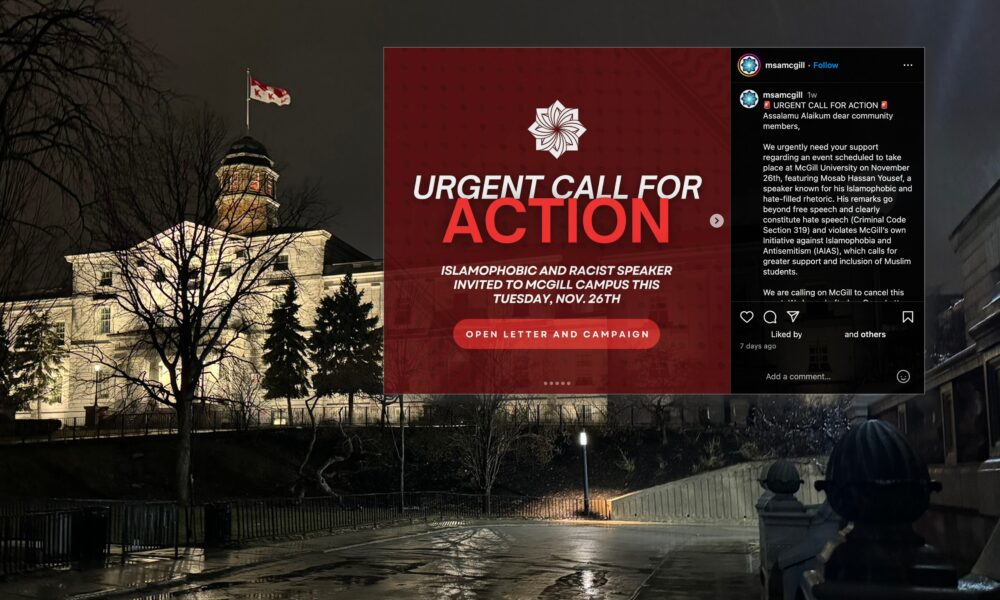Faced with criticism from 14 student groups and over 3,000 students, McGill moved—but did not cancel—a talk by Mosab Hassan Yousef from the McIntyre Medical Building to Zoom on Nov. 26. Yousef is the son of Hamas co-founder Sheikh Hassan Yousef. Defecting from Hamas in 1997, Yousef acted as a spy for the Israeli government until moving to the U.S. in 2007. McGill’s decision to host this speaker was met with backlash from many student groups on campus, who pointed to Yousef’s Islamophobic and xenophobic comments on social media and at other university campuses.
On Nov. 22, the Muslim Law Students’ Association (MLSA) contacted McGill’s Vice-President (Administration and Finance), Fabrice Labeau, and the Interim Deputy Provost (Student Life & Learning), Angela Campbell, to request that the talk be cancelled. The MLSA stated that Yousef’s lecture violated the Charter of Students’ Rights, which affirms that all students have the right to be treated with equality, dignity, and respect on campus.
The group also issued a call to action, asking that 1,000 students who objected to the talk also email the administration with their concerns. Over 3,000 joined the initiative and submitted letters. MLSA claims that Campbell and Labeau refused to cancel the talk, noting that McGill routinely hosts “controversial speakers” and that beyond providing “space and security,” the administration does not endorse the message behind these lectures. McGill did not offer further comment on this issue.
The Muslim Students’ Association (MSA) created an open letter that demanded McGill cancel the talk due to the harm Yousef’s Islamophobic rhetoric could have on Muslim, Palestinian, and Arab students on campus. The MSA also called for an investigation of the faculty members responsible for organizing the event. Student groups such as the Syrian, Moroccan, Egyptian, Algerian, Iraqi, Lebanese, and Bangladeshi students’ associations signed the letter, as well as 378 students and 571 members of the community beyond McGill.
In a written statement to The Tribune, the MSA stated that they wrote the open letter to demonstrate that their safety concerns were shared across McGill’s student body.
“[Yousef’s] ideas, deeply rooted in his animosity towards us, promote dangerous and baseless narratives that are undeniably Islamophobic and xenophobic, even going so far as to deem us as less than human,” the MSA wrote. “This goes well into the realm of hate speech, and directly contradicts the university’s stated mission to foster a campus environment built on respect and inclusion.”
Montreal4Palestine planned an on-campus protest on the day of the talk for all opposed to Yousef’s rhetoric. To discourage this demonstration, McGill elected to move the talk from an in-person event to Zoom. In an email sent to all students afterwards, Labeau and Campbell wrote that the planned protest “incited waves of online anger, including a targeted death threat.” They went on to state that although guest talks are a vital part of life at McGill, the university’s first priority is to avoid the obstruction of academic life on campus.
“Where security threats exist, we must intervene, and that threat level has been escalating steadily, today reaching a new height,” Labeau and Campbell wrote. “We have communicated with police, but the risk to event participants and the McGill community remains unacceptably high. Accordingly, we have required the organizers to move their event online.”
Labeau and Campbell further wrote that until January, the university will cease approval of “space bookings for extracurricular events.”
The Iraqi Students’ Society (ISS) expressed disappointment, but not surprise, at McGill’s decision to still hold the talk despite the concerns brought forward by multiple student groups.
“Admin only moved this event online out of fear of any ‘violence’ that could take place,” ISS wrote to The Tribune. “But the more proper reason should have been to protect the safety of its Muslim students from an openly Islamophobe extremist.”
The MSA explained that the open letter was created to prevent a precedent from being set, which would allow further extremists to spread harmful rhetoric on campus.
“Our safety and right to peacefully partake in campus life are non-negotiable,” the MSA wrote. We neither can nor will be silenced in the face of such extremist ideologies or other threats to these rights. We will always unite in defense of the Muslim community, and push the university to recognize this event for what it was—a profound moral failure.”









